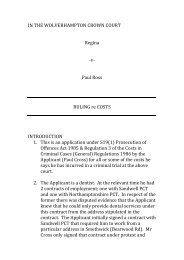Joint Enterprise in International Criminal Law
Webinar, 21st May 2020
Webinar, 21st May 2020
- No tags were found...
You also want an ePaper? Increase the reach of your titles
YUMPU automatically turns print PDFs into web optimized ePapers that Google loves.
intent … the better approach under international criminal law is not to allow
convictions under JCE III for special intent crimes like terrorism. In other words, it
would be insufficient for a finding of guilt for an accused charged as a participant in a
JCE (directed, for instance, to the commission of robbery or murder) to have foreseen
the possibility that the crimes within the common purpose would eventually give rise
to a terrorist act by another participant in the criminal enterprise. He must have the
required special intent for terrorism; he must specifically intend to cause panic or to
coerce a national or international authority”
Interlocutory Decision of the STL, STL-11-01/, 16 February 2011 at paragraph 249
SLIDE 15
47. In Prosecutor v CHEA Leang & KHIEU Samphan, 002/19-09/2007-ECCC/SC, 23
November 2016, the Supreme Court of the ECCC also gave JCE III the thumbs down,
giving a judicial kicking to the judgment in Tadic, in the process:
“…the decisions upon which the ICTY Appeals Chamber relied in Tadic when finding
that JCE III was part of customary international law did not constitute a ‘sufficiently
firm basis’ for such a finding”, the Supreme Court held (para.791)
“…Too little was known about the Essen Lynching case and the Borkum Island case to
conclude that a notion amounting to JCE III was applied therein” (para.791)
48. The Italian cases referred to in Tadic were either ‘misplaced’ by the ICTY Appeals
Chamber (in that they too did not involve a crime falling outside the common plan);
or were inconsistent and highly context dependent; or as they involved ordinary
crimes under ordinary Italian law, adjudicated by Italian domestic courts were of
limited relevance (paragraphs 795-798).
49. The Supreme Court reviewed a number of other cases dating from the post-WWII
period relating to liability for participation in the implementation of a common
14










